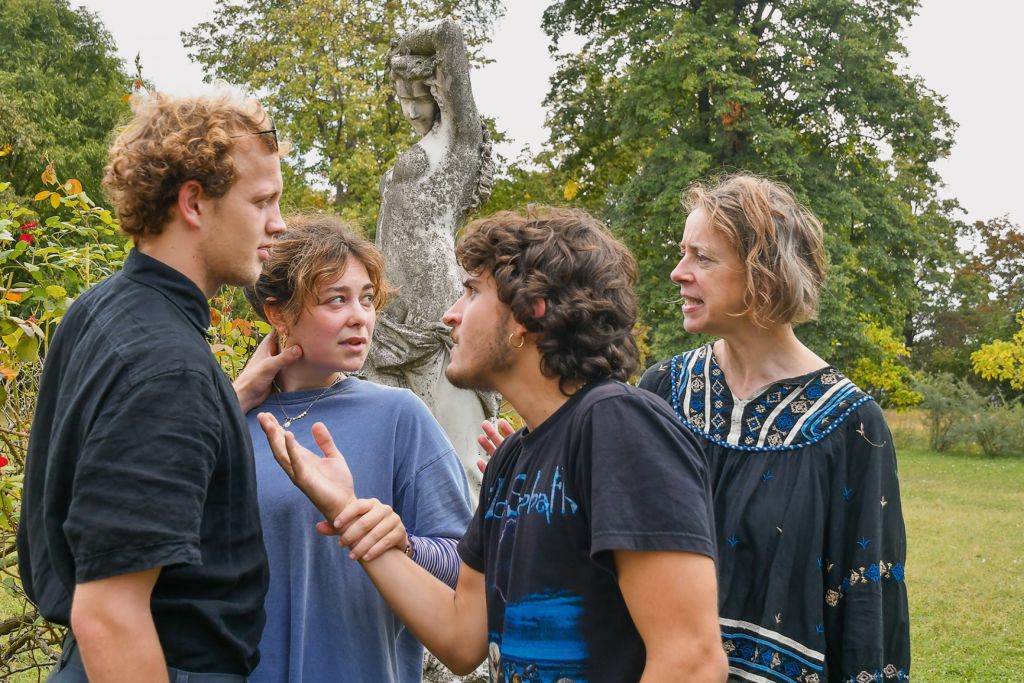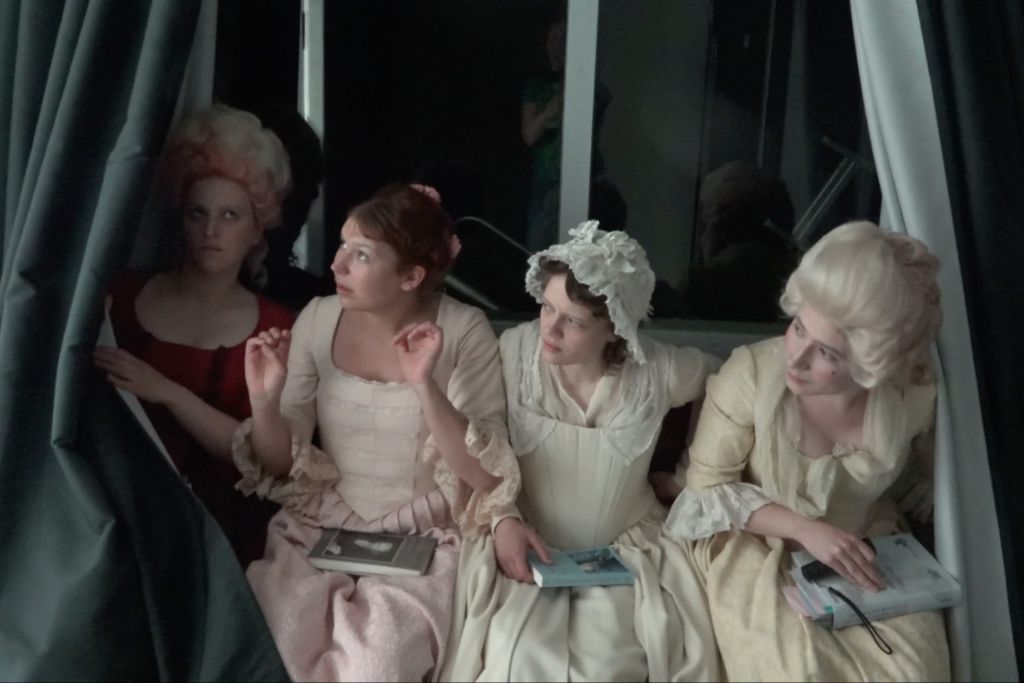Just what is it that underpins the actor’s craft? Anja Thiemann, a professor at the Max Reinhardt Seminar since March 2023, provides mdw Magazine with some insights into her work with first-year acting students, her multifaceted career, and her efforts to put suppressed women authors back in the spotlight.

Fundamental Skills
Sharpening one’s perception and powers of observation is central to the basic role development course Grundlagen der Rollengestaltung. What do students notice about themselves, other people, and the world around them, and how can they describe it? Here, students become aware of what all one can see and then portray. “The tool for this is language. In our work, we awaken and train the skill of describing what we’ve observed in a nuanced manner,” says Thiemann. A significant part of actors’ work is speaking about characterisation in a way that goes beyond one’s own private tastes. And in order to do so, it’s necessary to understand the difference between describing what one has seen and interpreting it. On this, Thiemann states: “We can agree on the facts—i.e., what we’ve just seen onstage. But our interpretations depend on individual factors like our socialisation, the generation to which we belong, and our life experience.” What acting students realise about description and interpretation serves to prepare them for their future work together with directors, because: “When a director describes something, actors need to be able to translate it into their acting.” Describing something in a way that’s free of value judgments is a challenge for students in class, she notes, “because we live in a society where it’s easy and quite common to ‘like’ or otherwise rate things or behaviours.”
Stages of a Career
Thiemann previously taught at the Ernst Busch Academy of Dramatic Arts in Berlin, the University of Music and Theatre “Felix Mendelssohn Bartholdy” in Leipzig, Mozarteum University in Salz-burg, and the Otto Falckenberg School of the Performing Arts in Munich. The opportunity to live in culturally diverse Vienna that comes along with her professorship at the Max Reinhardt Seminar is something with which she’s especially delighted. Thiemann’s own path into acting began in children’s theatre in East Germany, where she grew up. She was fascinated by the head of her theatre group, who sparked her early interest in becoming an actor herself. Unsuccessful initial attempts at being admitted to acting school later on led her to first study ethnography and history at the Humboldt University of Berlin. After the fall of communism, however, Thiemann took a second stab at applying to acting programmes and was accepted by the Ernst Busch Academy of Dramatic Arts. For her, it was a dream come true. Thiemann’s studies in ethnography and history did, however, continue to serve her as “an important source of knowledge, tolerance, and imagination in teaching and in various projects”. Acting engagements have since taken her to numerous stages—and due to her longstanding strong interest in improvisation as a dramatic art, she also joined the German Institute of Improvisation. In her fundamentals courses at the Max Reinhardt Seminar, acting students learn techniques of reproduction. But even so, Thiemann seeks to also instil in them the courage to improvise: “a sense of failure is felt by actors at some point in nearly every production, and it’s both possible and important to use improvisation to practice dealing with such anxieties.”

“Forgotten” Women Authors
A matter of great personal importance to Thiemann is her project “‘Vergessene’ Autorinnen” [“Forgotten” Women Authors]. During the COVID lockdowns, she joined forces with students to search for 18th- and 19th-century works by female dramatic writers who had been pushed out of public perception. “I’d asked myself why the theatrical world has no awareness of these authors,” explains Thiemann. Among other things, her own research revealed that though these authors and their works had indeed initially been mentioned in the lexica that were once used for purposes including theatres’ selection of works to perform, they gradually disappeared in subsequent editions. “It was an insidious process, how they—in contrast to their male colleagues, whom we still know today—were pushed into obscurity, ultimately because of patriarchal structures,” says Thiemann. This is joined by the fact that 18th-century works were often authored anonymously or published as “by a gentlewoman”. “It was long the case that authorship wasn’t usually much of a thing because works were only performed once. Only when works started to be performed repeatedly did their creators become relevant,” explains Thiemann. She intends to continue researching this topic and is convinced that, in the mdw, she has found the ideal place to do so: “The perception of female composers from the past is just as full of holes. And at the mdw, the will to research this exists—as do colleagues who are interested and involved in doing so.” Thiemann is certain that “there are so many interesting female authors and works to be discovered, and what I want is to help make them accessible outside of the archives and get them performed.” This autumn, the theatre Schauspielhaus Graz hosted the première of a work by one of these “disappeared” authors—Düval und Charmille by Christiane Karoline Schlegel—in a programme entitled Von einem Frauenzimmer [By a Gentlewoman]. 245 years had passed since its publication.

